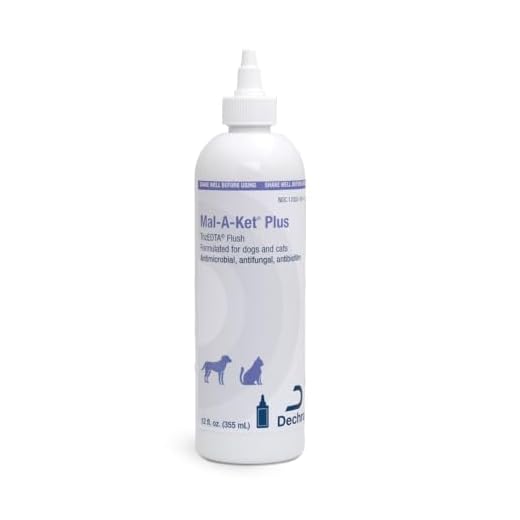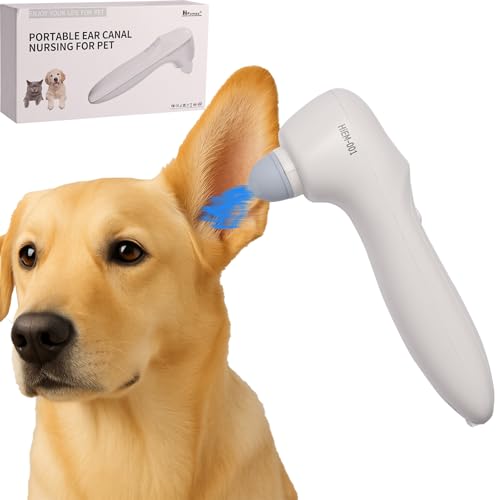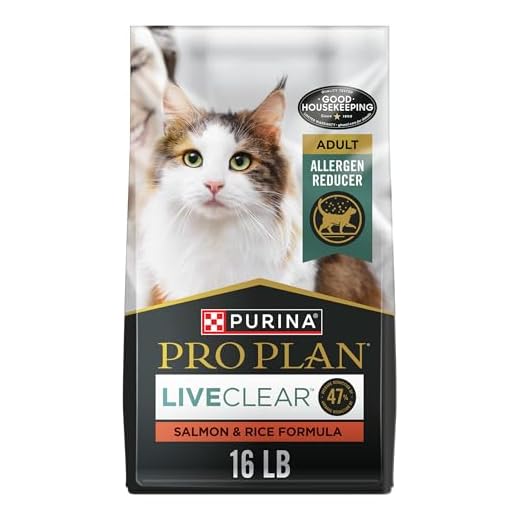



It’s not just a random habit; constant attention to my auditory organs can signal several underlying issues. First, an abundance of earwax might be at play. A quick check can reveal if there’s a buildup that requires gentle cleaning.
Another possibility involves pesky parasites like ear mites. These little invaders can cause significant discomfort, leading to persistent pawing and irritation. A visit to the veterinarian can confirm their presence through a simple examination.
Infections are also a concern. Bacterial or yeast infections can trigger inflammation, causing me to fuss with my ears more than usual. Observing for unusual discharge or a peculiar odor can help identify this issue, prompting a trip to the vet for proper treatment.
Allergies, whether environmental or food-related, can manifest in various ways, including ear irritation. Keeping track of any recent changes in diet or surroundings can be insightful. Consulting with a veterinary professional for allergy testing or advice on suitable diets is essential.
Lastly, it’s crucial to remember that stress or anxiety can lead to repetitive behaviors. Creating a calm environment with plenty of enrichment can alleviate some of that nervous energy. Always stay attentive to these signs, as they can guide us toward a healthier and happier life.
Understanding My Ear Behavior
Frequent pawing at my outer ear area often signals irritation or discomfort. I recommend a thorough inspection of the ear canal to check for debris, wax buildup, or any signs of infection. Regular grooming helps prevent these issues.
Possible Allergens
Environmental factors, such as pollen or dust, might trigger allergic reactions. It’s wise to monitor for additional symptoms like sneezing or watery eyes. Consulting a veterinarian can lead to effective allergy management strategies.
Parasite Presence
Fleas or mites can cause significant irritation. Look for excessive scratching, redness, or tiny black specks in the fur. A vet visit can confirm the presence of parasites and provide appropriate treatments.
Maintaining a clean living environment can minimize exposure to irritants. Regular check-ups with a veterinarian ensure ongoing ear health and prompt attention to any emerging issues.
Identifying Common Causes of Ear Scratching in Cats
First, check for parasites. Fleas and ticks often cause discomfort in the ear area, leading to frequent pawing and irritation. A thorough grooming session can help spot these pests and provide relief.
Allergies
Allergic reactions to food or environmental factors can manifest in various ways, including itchiness around the ears. Monitor for any changes in diet or new products introduced in the home. Consider consulting a veterinarian for allergy testing.
Infections
Ear infections are another common issue. Signs may include redness, discharge, or a foul smell. If you notice these symptoms, a prompt visit to the vet for diagnosis and treatment is essential.
Be attentive to the signs of discomfort. Regular check-ups can help catch underlying issues early. For those wondering about toys, explore whether do cats like chew toys to keep your furry friend engaged and distracted.
Signs of Ear Infections and How to Spot Them
If my human notices excessive head shaking or tilting, it might signal something wrong. A strong odor emanating from my auditory area can indicate an infection. Discharge, especially if it’s brown or black, is another telltale sign. It’s important to observe for redness or swelling in the skin surrounding my auditory region. If I seem more irritable or less social than usual, it could mean discomfort due to an underlying issue.
Sometimes, my human might see me pawing at my head or rubbing it against surfaces. If I’m suddenly sensitive to touch around that area, it’s a cause for concern. Changes in my grooming habits, like neglecting to clean my fur or the area around my eyes and nose, can also hint at problems. If I lose my appetite or seem unusually lethargic, these signs shouldn’t be ignored.
Regular check-ups with the vet can help catch these issues early. If any of these symptoms arise, it’s best to seek professional help promptly. Early detection can make a significant difference in treatment and recovery.
Understanding Allergies: Food and Environmental Triggers
Food sensitivities can often lead to discomfort and irritation. Monitoring diet is crucial. Common allergens include chicken, beef, dairy, and certain grains. Transitioning to a hypoallergenic diet can help identify triggers.
| Common Food Allergens | Symptoms |
|---|---|
| Chicken | Itching, skin irritation |
| Beef | Gastrointestinal upset, scratching |
| Dairy | Skin lesions, excessive grooming |
| Grains | Inflammation, ear irritation |
Environmental allergens, such as pollen, mold, and dust mites, can also provoke reactions. Regular cleaning of living spaces can minimize exposure. Using air purifiers may decrease airborne irritants.
Consulting with a veterinarian for allergy testing can provide clarity. Identifying specific allergens allows for targeted treatment, improving comfort and quality of life.
When to Consult a Veterinarian for Ear Issues
If you notice any of the following signs, seek veterinary assistance immediately:
- Persistent head shaking or tilting.
- Unpleasant odor emanating from the ears.
- Redness or swelling in the ear canal.
- Excessive discharge, whether it’s waxy or bloody.
- Behavior changes, such as increased irritability or withdrawal.
In addition, if your furry friend has a history of ear problems, regular check-ups can help prevent serious complications. Proactive care ensures that minor issues are caught before they escalate.
Be alert for signs of discomfort, like sensitivity around the head or reluctance to be touched there. These can indicate pain or infection that requires immediate attention.
For those who suspect allergies, a vet can assist in identifying triggers, whether they are environmental or food-related. This can be crucial for enhancing quality of life.
If you’re worried about potential pests, such as how to keep possums away from cat food, addressing this may also help reduce ear issues linked to infestations.
It’s not just a random habit; constant attention to my auditory organs can signal several underlying issues. First, an abundance of earwax might be at play. A quick check can reveal if there’s a buildup that requires gentle cleaning.
Another possibility involves pesky parasites like ear mites. These little invaders can cause significant discomfort, leading to persistent pawing and irritation. A visit to the veterinarian can confirm their presence through a simple examination.
Infections are also a concern. Bacterial or yeast infections can trigger inflammation, causing me to fuss with my ears more than usual. Observing for unusual discharge or a peculiar odor can help identify this issue, prompting a trip to the vet for proper treatment.
Allergies, whether environmental or food-related, can manifest in various ways, including ear irritation. Keeping track of any recent changes in diet or surroundings can be insightful. Consulting with a veterinary professional for allergy testing or advice on suitable diets is essential.
Lastly, it’s crucial to remember that stress or anxiety can lead to repetitive behaviors. Creating a calm environment with plenty of enrichment can alleviate some of that nervous energy. Always stay attentive to these signs, as they can guide us toward a healthier and happier life.
Understanding My Ear Behavior
Frequent pawing at my outer ear area often signals irritation or discomfort. I recommend a thorough inspection of the ear canal to check for debris, wax buildup, or any signs of infection. Regular grooming helps prevent these issues.
Possible Allergens
Environmental factors, such as pollen or dust, might trigger allergic reactions. It’s wise to monitor for additional symptoms like sneezing or watery eyes. Consulting a veterinarian can lead to effective allergy management strategies.
Parasite Presence
Fleas or mites can cause significant irritation. Look for excessive scratching, redness, or tiny black specks in the fur. A vet visit can confirm the presence of parasites and provide appropriate treatments.
Maintaining a clean living environment can minimize exposure to irritants. Regular check-ups with a veterinarian ensure ongoing ear health and prompt attention to any emerging issues.
Identifying Common Causes of Ear Scratching in Cats
First, check for parasites. Fleas and ticks often cause discomfort in the ear area, leading to frequent pawing and irritation. A thorough grooming session can help spot these pests and provide relief.
Allergies
Allergic reactions to food or environmental factors can manifest in various ways, including itchiness around the ears. Monitor for any changes in diet or new products introduced in the home. Consider consulting a veterinarian for allergy testing.
Infections
Ear infections are another common issue. Signs may include redness, discharge, or a foul smell. If you notice these symptoms, a prompt visit to the vet for diagnosis and treatment is essential.
Be attentive to the signs of discomfort. Regular check-ups can help catch underlying issues early. For those wondering about toys, explore whether do cats like chew toys to keep your furry friend engaged and distracted.
Signs of Ear Infections and How to Spot Them
If my human notices excessive head shaking or tilting, it might signal something wrong. A strong odor emanating from my auditory area can indicate an infection. Discharge, especially if it’s brown or black, is another telltale sign. It’s important to observe for redness or swelling in the skin surrounding my auditory region. If I seem more irritable or less social than usual, it could mean discomfort due to an underlying issue.
Sometimes, my human might see me pawing at my head or rubbing it against surfaces. If I’m suddenly sensitive to touch around that area, it’s a cause for concern. Changes in my grooming habits, like neglecting to clean my fur or the area around my eyes and nose, can also hint at problems. If I lose my appetite or seem unusually lethargic, these signs shouldn’t be ignored.
Regular check-ups with the vet can help catch these issues early. If any of these symptoms arise, it’s best to seek professional help promptly. Early detection can make a significant difference in treatment and recovery.
Understanding Allergies: Food and Environmental Triggers
Food sensitivities can often lead to discomfort and irritation. Monitoring diet is crucial. Common allergens include chicken, beef, dairy, and certain grains. Transitioning to a hypoallergenic diet can help identify triggers.
| Common Food Allergens | Symptoms |
|---|---|
| Chicken | Itching, skin irritation |
| Beef | Gastrointestinal upset, scratching |
| Dairy | Skin lesions, excessive grooming |
| Grains | Inflammation, ear irritation |
Environmental allergens, such as pollen, mold, and dust mites, can also provoke reactions. Regular cleaning of living spaces can minimize exposure. Using air purifiers may decrease airborne irritants.
Consulting with a veterinarian for allergy testing can provide clarity. Identifying specific allergens allows for targeted treatment, improving comfort and quality of life.
When to Consult a Veterinarian for Ear Issues
If you notice any of the following signs, seek veterinary assistance immediately:
- Persistent head shaking or tilting.
- Unpleasant odor emanating from the ears.
- Redness or swelling in the ear canal.
- Excessive discharge, whether it’s waxy or bloody.
- Behavior changes, such as increased irritability or withdrawal.
In addition, if your furry friend has a history of ear problems, regular check-ups can help prevent serious complications. Proactive care ensures that minor issues are caught before they escalate.
Be alert for signs of discomfort, like sensitivity around the head or reluctance to be touched there. These can indicate pain or infection that requires immediate attention.
For those who suspect allergies, a vet can assist in identifying triggers, whether they are environmental or food-related. This can be crucial for enhancing quality of life.
If you’re worried about potential pests, such as how to keep possums away from cat food, addressing this may also help reduce ear issues linked to infestations.
It’s not just a random habit; constant attention to my auditory organs can signal several underlying issues. First, an abundance of earwax might be at play. A quick check can reveal if there’s a buildup that requires gentle cleaning.
Another possibility involves pesky parasites like ear mites. These little invaders can cause significant discomfort, leading to persistent pawing and irritation. A visit to the veterinarian can confirm their presence through a simple examination.
Infections are also a concern. Bacterial or yeast infections can trigger inflammation, causing me to fuss with my ears more than usual. Observing for unusual discharge or a peculiar odor can help identify this issue, prompting a trip to the vet for proper treatment.
Allergies, whether environmental or food-related, can manifest in various ways, including ear irritation. Keeping track of any recent changes in diet or surroundings can be insightful. Consulting with a veterinary professional for allergy testing or advice on suitable diets is essential.
Lastly, it’s crucial to remember that stress or anxiety can lead to repetitive behaviors. Creating a calm environment with plenty of enrichment can alleviate some of that nervous energy. Always stay attentive to these signs, as they can guide us toward a healthier and happier life.
Understanding My Ear Behavior
Frequent pawing at my outer ear area often signals irritation or discomfort. I recommend a thorough inspection of the ear canal to check for debris, wax buildup, or any signs of infection. Regular grooming helps prevent these issues.
Possible Allergens
Environmental factors, such as pollen or dust, might trigger allergic reactions. It’s wise to monitor for additional symptoms like sneezing or watery eyes. Consulting a veterinarian can lead to effective allergy management strategies.
Parasite Presence
Fleas or mites can cause significant irritation. Look for excessive scratching, redness, or tiny black specks in the fur. A vet visit can confirm the presence of parasites and provide appropriate treatments.
Maintaining a clean living environment can minimize exposure to irritants. Regular check-ups with a veterinarian ensure ongoing ear health and prompt attention to any emerging issues.
Identifying Common Causes of Ear Scratching in Cats
First, check for parasites. Fleas and ticks often cause discomfort in the ear area, leading to frequent pawing and irritation. A thorough grooming session can help spot these pests and provide relief.
Allergies
Allergic reactions to food or environmental factors can manifest in various ways, including itchiness around the ears. Monitor for any changes in diet or new products introduced in the home. Consider consulting a veterinarian for allergy testing.
Infections
Ear infections are another common issue. Signs may include redness, discharge, or a foul smell. If you notice these symptoms, a prompt visit to the vet for diagnosis and treatment is essential.
Be attentive to the signs of discomfort. Regular check-ups can help catch underlying issues early. For those wondering about toys, explore whether do cats like chew toys to keep your furry friend engaged and distracted.
Signs of Ear Infections and How to Spot Them
If my human notices excessive head shaking or tilting, it might signal something wrong. A strong odor emanating from my auditory area can indicate an infection. Discharge, especially if it’s brown or black, is another telltale sign. It’s important to observe for redness or swelling in the skin surrounding my auditory region. If I seem more irritable or less social than usual, it could mean discomfort due to an underlying issue.
Sometimes, my human might see me pawing at my head or rubbing it against surfaces. If I’m suddenly sensitive to touch around that area, it’s a cause for concern. Changes in my grooming habits, like neglecting to clean my fur or the area around my eyes and nose, can also hint at problems. If I lose my appetite or seem unusually lethargic, these signs shouldn’t be ignored.
Regular check-ups with the vet can help catch these issues early. If any of these symptoms arise, it’s best to seek professional help promptly. Early detection can make a significant difference in treatment and recovery.
Understanding Allergies: Food and Environmental Triggers
Food sensitivities can often lead to discomfort and irritation. Monitoring diet is crucial. Common allergens include chicken, beef, dairy, and certain grains. Transitioning to a hypoallergenic diet can help identify triggers.
| Common Food Allergens | Symptoms |
|---|---|
| Chicken | Itching, skin irritation |
| Beef | Gastrointestinal upset, scratching |
| Dairy | Skin lesions, excessive grooming |
| Grains | Inflammation, ear irritation |
Environmental allergens, such as pollen, mold, and dust mites, can also provoke reactions. Regular cleaning of living spaces can minimize exposure. Using air purifiers may decrease airborne irritants.
Consulting with a veterinarian for allergy testing can provide clarity. Identifying specific allergens allows for targeted treatment, improving comfort and quality of life.
When to Consult a Veterinarian for Ear Issues
If you notice any of the following signs, seek veterinary assistance immediately:
- Persistent head shaking or tilting.
- Unpleasant odor emanating from the ears.
- Redness or swelling in the ear canal.
- Excessive discharge, whether it’s waxy or bloody.
- Behavior changes, such as increased irritability or withdrawal.
In addition, if your furry friend has a history of ear problems, regular check-ups can help prevent serious complications. Proactive care ensures that minor issues are caught before they escalate.
Be alert for signs of discomfort, like sensitivity around the head or reluctance to be touched there. These can indicate pain or infection that requires immediate attention.
For those who suspect allergies, a vet can assist in identifying triggers, whether they are environmental or food-related. This can be crucial for enhancing quality of life.
If you’re worried about potential pests, such as how to keep possums away from cat food, addressing this may also help reduce ear issues linked to infestations.











